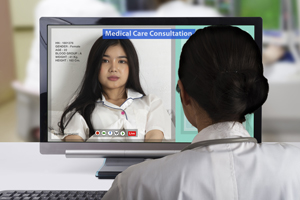Telehealth for ADHD?

Question: Our family lives in a rural county. The nearest city with a teen ADHD program is two hours away. I’ve been reading about telemental health services, but I’m still not sure what they are or how they work. Can they help my son and his ADHD?
Answer: “Telemental” is a relatively new word meaning mental health services provided by a qualified healthcare provider using videoconferencing and other secured communication tools. This is similar to “telemedicine,” where a doctor or other medical resource provides services or assistance to a patient at a distant location.
“Telemental health services are unquestionably effective in most regards, although more analysis is needed,” writes Donald M. Hilty, MD, and colleagues in The Effectiveness of Telemental Health. “They are effective for diagnosis and assessment, across many populations (adult, child, geriatric, and ethnic), for disorders in many settings (emergency, home health). [These services] are comparable to in-person care and complement other services in primary care.”
According to Rural Health Information Hub, more than 66 million people in the United States live in non-metropolitan counties with a shortage of mental health professionals. Of these people, about 18.7 percent are in need of mental health care. That’s a great many people unable to work locally with a doctor or mental health professional.
“Telemental health is one approach to rectifying geographic disparity in access to evidence-based mental health treatment for ADHD,” writes Carolyn A. McCarty and colleagues in Interventions developed for psychiatric and behavioral treatment in the children’s ADHD Telemental Health Treatment Study. “It is possible to provide direct psychiatric and behavioral services through telepsychiatry and to train and supervise therapists remotely.”
Telemental health services for ADHD: how it might work
Regarding your teen’s ADHD treatment, telemental health services could open the possibility of working with a specialist in teen ADHD who you would not otherwise be able to access. However, the costs for videoconferencing equipment and training have limited the number of healthcare providers who offer this service, mostly to larger hospital and university programs.
Services are ideally provided through a secured point-to-point connectivity or communication service that meets HIPAA requirements. Some healthcare providers, especially those with independent practices, may opt for commonly available videoconferencing programs or apps, such as Skype, Google+, Duo, or other popular services. It’s important to note these programs do not have the security to meet HIPAA requirements but may be more readily available for patients to access and don’t have the costs for professionals that are associated with the secured point-to-point connectivity or communication services.
To receive care, you and your teen might go to a local medical office equipped with the secured videoconferencing system. There, you’ll meet by teleconference with the specialist who has developed the skills needed to work well with patients remotely. After you both speak with the specialist by videoconference at the beginning of the session, your teen would meet with the provider alone for counseling. At the end of the session, you would again talk with the provider about follow-up information. If there are changes in prescribed medication, that information would be sent electronically to you or the local healthcare provider. In addition to the videoconference appointments, you would communicate with the specialist by telephone or email when necessary. Information, including medical records, would be sent by encrypted email to protect your teen’s medical privacy.
Payment for telemental health services can be problematic, making services less available. One hurdle to telemental healthcare for ADHD and other conditions is the provider’s ability to bill for services. Some county-based healthcare programs will not provide payment for services originating outside of the county, including telemental services. Because this method of service delivery is still so new, private insurance companies sometimes won’t reimburse remotely provided services and are uninformed about the nature of how these services are delivered or supported.
Are telemental health services right for your teen?
Talk with your teen’s current healthcare provider for a referral to a healthcare center that provides ADHD treatment to explore telemental health services. Alternatively, you could contact a local children’s hospital or university center that provides ADHD treatment or check our list of hospital and university ADHD centers. Contact the center or professional you think might be most helpful for your teen and ask if telemental health services are available. If not, ask whether the program can suggest a provider who can work remotely with your teen. In some cases, an initial in-person appointment may be needed before telemental services for ADHD can begin.
Learn more about telemedicine options for ADHD:
Do you have a question about ADHD? You can contact our Health Information Specialist team from 1-5 p.m., Monday through Friday at 866-200-8098 or ask our community member in ADHD Parents Together.
Join the discussion: Would you use telehealth services for ADHD?
